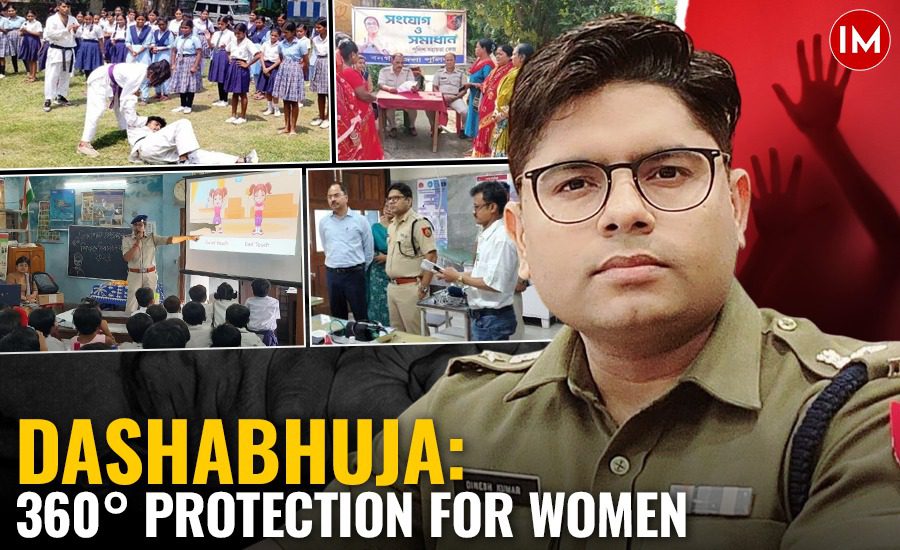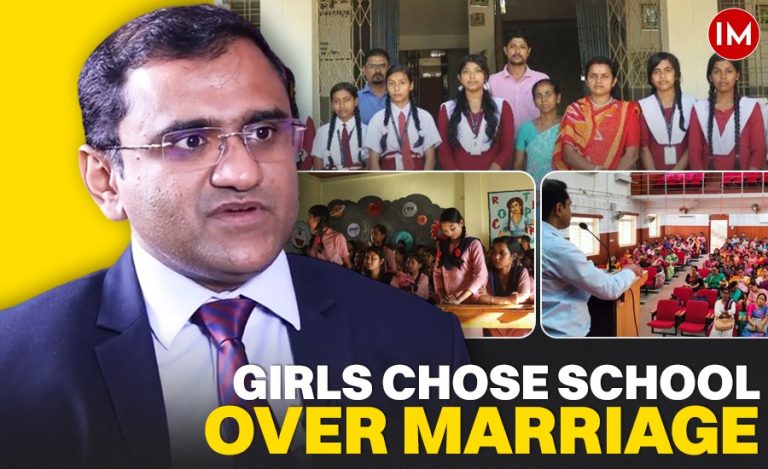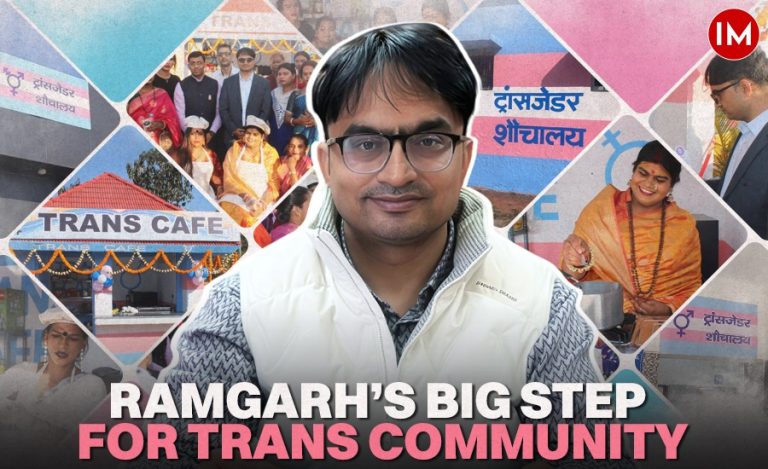In the bustling border district of Bongaon, West Bengal, where rural landscapes meet urban challenges, women’s safety has long been a pressing concern. Amid rising incidents of gender-based violence and the complexities of modern threats like cybercrimes, one innovative programme is turning the tide.
Led by IPS officer Dinesh Kumar, Superintendent of Police (SP) for Bongaon Police District—a 2012-batch officer from the West Bengal cadre—the “Dashabhuja: Ensuring Women’s Safety 360°” initiative is a comprehensive, multi-faceted shield for women. Drawing its name from the ten-armed goddess Durga, symbolising all-encompassing protection, Dashabhuja integrates technology, community engagement, and proactive policing to create a safer environment for women of all ages.
A HOLISTIC SAFETY INITIATIVE
Kumar, known for his forward-thinking approach, launched Dashabhuja as Bongaon PD’s flagship programme. “Women’s safety isn’t just about reacting to crimes; it’s about preventing them through a holistic, 360-degree strategy,” Mr Kumar shared in a conversation with Indian Masterminds. Covering a district with diverse terrains—from remote villages to tourist spots—the initiative addresses vulnerabilities in both physical and virtual spaces. It involves ten interconnected verticals, each tackling a specific aspect of safety while emphasising cost-effectiveness and replicability. With minimal financial outlay—such as Rs 16,000 per “Rakshak” for one-time equipment like body cameras and smartphones—the program leverages existing government resources to maximise impact.
At the heart of Dashabhuja is NIRIKSHA, the security audit vertical. This involves thorough inspections of public and private spaces, from hospitals and schools to hotels and housing complexes. In collaboration with community stakeholders, audits focus on CCTV coverage mapped via GIS, identifying “dark spots” for improved lighting and patrolling, and ensuring police verification certificates (PCC) for contractual workers. Mr Kumar’s team has issued over 800 letters post-inspection, mandating compliance. For instance, at Dr. J.R. Dhar Sub-Divisional Hospital, audits led to enhanced surveillance and orientation programmes for security guards. “We’ve sensitised owners to prioritise women’s security, ensuring no unverified staff are employed,” Mr Kumar notes. Additional checks include facilities like female toilets, crèches, and services for specially-abled women, alongside verifying Internal Complaints Committees (ICCs) in institutions.
RAPID-RESPONSE AND ON-GROUND PROTECTION
Complementing audits is RAKSHA KAVACH, a rapid-response mechanism designed for even the remotest areas. Bongaon PD has deployed 40 “Rakshaks”—dedicated police personnel assigned to each Gram Panchayat (GP). Equipped with smartphones, body cameras, and customised motorbikes with beacons and hooters, Rakshaks patrol from 7 to 10 AM and 4 to 11 PM, with village police handling off-hours. Integrated with the 24/7 Women’s District Helpline (7319224450) and Emergency Response Support System (ERSS) 112, distress calls are routed to the nearest Rakshak via the control room, ensuring a response within 10 minutes.
Real-time feedback is collected, and locations are tracked via a WhatsApp group, with plans for app integration. Examples from call logs illustrate its efficacy: a domestic violence case in Bagdah was resolved in two minutes, while a harassment incident in Petrapole took nine. “In women’s security cases, even a five-minute delay can embolden criminals,”Mr Kumar emphasises. “Rakshaks instill confidence, showing that help is just a call away.” With 38 of 40 police stations featuring these units, shifts cover peak hours, adapting to rural-urban differences.
TRAINING, AWARENESS AND EMPOWERMENT
Empowerment through skills forms the core of SHAKTI, offering free self-defence training to girls in classes 8-12 across 129 schools and colleges. Accredited trainers cover physical techniques and digital threats like blackmail, image-morphing, and AI deepfakes. Graduates earn “Cyber Sakhi” certification, enabling them to train others for an exponential impact. In the last three months, 55 schools have been covered, with sessions at places like New Bongaon Girls High School fostering resilience.
Awareness drives under JAGRITI target age-specific issues in all 736 educational institutions. Primary students learn about “good touch-bad touch”, adolescents about the POCSO Act and elopement risks via the Swayam Siddha programme, and adults about domestic violence, the POSH Act, and cybercrimes. The helpline is promoted extensively, with 66 schools reached recently. Interactive sessions with the WINNERS team (Women in Need of Emergency Response and Support) address eve-teasing, while campaigns on senior citizens’ rights build broader community vigilance.
JUSTICE, OVERSIGHT AND COMMUNICATION
Ensuring justice is NITI SATATA’s mandate, prioritising swift legal action from reporting to conviction. Victims are informed of rights like protection, legal aid via District Legal Services Authority (DLSA), privacy, medical care, and compensation. The Aparajita Task Force monitors trials in 65 cases, accelerating outcomes. “We don’t just register cases; we track them to deliver faster justice,” Mr Kumar says.
Oversight comes via DRISHTI, a continuous monitoring hub at the district control room. Teams track all verticals’ implementation, analyse social media for threats, and monitor history-sheeters involved in crimes against women. Data-driven adjustments ensure the initiative remains dynamic.
Communication bridges gaps in VAARTA, providing unique complaint numbers, regular updates, and counselling. Victims can seek status confidentially, with feedback integrated into an upcoming app. “Two-way dialogue builds trust,” Mr Kumar adds.
RECOGNITION, INNOVATION AND SENSITISATION
Recognition motivates under PRATISHTHA, felicitating courageous women, NGOs, and Good Samaritans who prevent crimes. Photos from events show police honouring contributors, inspiring community involvement.
SAMATA promotes gender sensitisation through workshops for police, adolescents, and stakeholders. Sessions at schools, colleges, and even hospitals like Dr. J.R. Dhar emphasise empathy and SOPs for handling offences.
Finally, PRAGATI drives innovation, analysing data for upgrades and integrating all verticals into a forthcoming app with SOS alerts and real-time tracking. The “Police Bandhu” app, already in use, enables GPS-based alerts, mobilising community volunteers—especially women—for immediate aid. “If a volunteer arrives in one minute, it prevents escalation before police arrive in six,” Mr Kumar shared with Indian Masterminds.
Dashabhuja’s success lies in its resource-savvy design. Beyond Rakshaks, mobile patrol vehicles and body cameras for all officers enhance response. Security audits have transformed over 800 institutions, mandating CCTVs in shadow zones. Counselling by lady sub-inspectors addresses victims’ mental health, with escorts to specialised care if needed—all covered by government schemes.
The initiative’s impact is evident in reduced response times and heightened community trust. In a district bordering Bangladesh, where vulnerabilities are high, Dashabhuja sets a precedent. Kumar envisions replication: “These pillars are cost-effective and adaptable. By sharing best practices, we can amplify safety nationwide.”
As women’s safety evolves with societal needs, officers like Dinesh Kumar exemplify proactive leadership. Dashabhuja isn’t just a programme—it’s a movement, empowering women to live fearlessly in Bongaon and beyond.
































